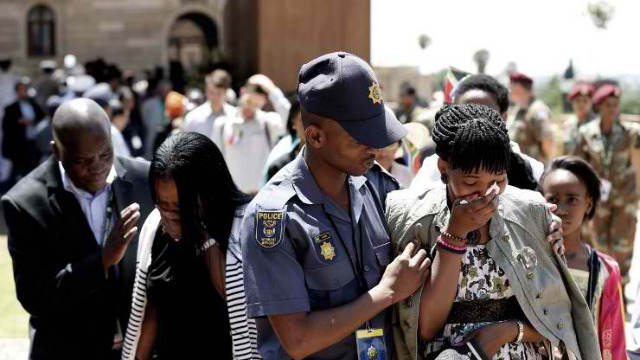SUMMARY
This is AI generated summarization, which may have errors. For context, always refer to the full article.

PRETORIA, South Africa – Crushing disappointment tainted the final day of Nelson Mandela’s lying in state Friday, December 13, with tens of thousands of mourners unable to say their personal farewell to the anti-apartheid icon.
Barely two hours after the public was allowed in to view the open-top casket, the government said it would be unable to accommodate the huge numbers still waiting and appealed for people to stay away.
Friday was the last opportunity to view the body of South Africa’s first black president in Pretoria, before it is transported to his boyhood village of Qunu for burial on Sunday, December 15.
Large numbers had camped out to secure an early place in the queue, but as of 7:30 am (0530 GMT) there were already 50,000 waiting for buses to the Union Buildings – the seat of government where the coffin has been laid out for 3 days.
Up to 24,000 people had viewed the coffin the day before.
By early afternoon, it was clear that most would never get inside, and people started leaving in sad, dejected droves – many of them having already been turned away the day before.
“We really thought this was the day. But again we did not get to see the old man,” said Lydia More, 31, who got in line at 7:00am.
“We just feel empty. It’s so sad,” she said.
‘The whole of South Africa wants to say goodbye’
Tempers frayed at one of the waiting venues, with mourners pushing back against police who tried to get them to go home, but there were no serious incidents.
“It’s just not possible,” said one police officer who declined to be named. “There are too many people. The whole of the Republic of South Africa wants to say goodbye.”
For those who did manage to enter the venue, the last glimpse of Mandela prompted powerful feelings.
“It’s truly a moving event. As you walk past his body, you’re overcome with emotion,” said Sakib Khan, a British national living in South Africa since 2002.
Mandela’s body is scheduled to be taken to Waterkloof air force base early Saturday morning, December 14, for the two-hour flight to Qunu in Eastern Cape province, where he grew up.
On Sunday, some 5,000 people, including foreign dignitaries and senior political figures, are expected to participate in a formal, two-hour ceremony beginning at 8:00 am (0600 GMT).
But the actual burial will be a strictly private affair, barred to both the general public and the media, government spokeswoman Phumla Williams told Agence France-Presse.
“The family has indicated they want to make the burial a family matter,” Williams said.
“They don’t want it to be televised. They don’t want people to see when the body is taken down,” she added.
Around 3,000 members of the media have already descended on Qunu where a special stage and marquee have been erected for the invited guests, who include Britain’s Prince Charles.
The funeral will be held according to traditional Xhosa rites overseen by male members of Mandela’s clan.
The slaughtering of an animal – a ritual performed through various milestones of a person’s life – will form a crucial part of the event.
“A funeral is an intricate ceremony that involves communicating with the ancestors and allowing the spirit of the departed person to rest,” said Chief Jonginyaniso Mtirara of the Thembu clan that Mandela hails from.
During the ceremony, Mandela will be referred to as Dalibhunga – the name given to him at the age of 16 as he entered adulthood.
Although Mandela never publicly declared his religious denomination, his family comes from a Methodist background.
‘No one thought of us’
While Qunu residents are expected to benefit from the status that will be attached to their village as Mandela’s final resting place, some are upset they will not be given a chance to view the body before burial.
“No one thought of us,” said Nomakula Mfikeleli, 61, who like many others in the village could not afford the time or money to travel to Pretoria for the lying in state.
“We would have loved to be given a chance to bid him farewell… like we have seen others doing on television,” Mfikeleli said.
Mandela always spoke nostalgically of what he remembered as an idyllic early childhood in the rolling hills around Qunu.
“From these days I date my love of the veld (grassland), of open spaces, the simple beauties of nature, the clean lines of the horizon,” Mandela wrote in his memoir “Long Walk to Freedom”.
He will be buried in the family estate he built there following his release from prison in 1990. – Rappler.com
Add a comment
How does this make you feel?
There are no comments yet. Add your comment to start the conversation.